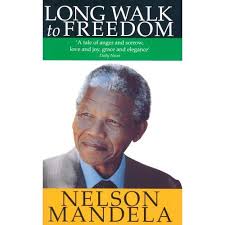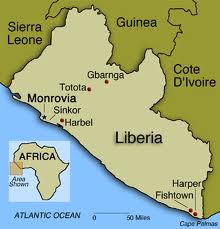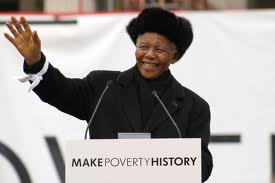Every so often I have a conversation that is more than usually meaningful – or feels like it would be if I could just pull it all together. I expect I’m not the only one. A recent example for me started with social media, moved to Nelson Mandela, and wove a path through power, wealth, corruption, and poverty in Liberia. Here is what I have made of it since.
>Social Media
 Conversations about social media, and particularly Facebook, can be intriguing as well as polarizing. At one extreme “Facebook is the best thing since sliced bread, invigorates democracy, gives everyone a voice, promotes solidarity – look at Arab Spring.” At the other, “it’s full of superficial, narcissistic, antisocial, dangerous, time-gobbling rubbish” and should be banned – to say nothing of the invasiveness of Big Brother messaging and advertising from Facebook itself, as recently chronicled by John Birmingham.
Conversations about social media, and particularly Facebook, can be intriguing as well as polarizing. At one extreme “Facebook is the best thing since sliced bread, invigorates democracy, gives everyone a voice, promotes solidarity – look at Arab Spring.” At the other, “it’s full of superficial, narcissistic, antisocial, dangerous, time-gobbling rubbish” and should be banned – to say nothing of the invasiveness of Big Brother messaging and advertising from Facebook itself, as recently chronicled by John Birmingham.
What can be missed from these conversations is that if I am writing this, and you are reading it, we almost certainly have the choice. We have access, and can decide whether or not to use it, as well as whether or not to use it constructively.
Nelson Mandela
Nelson Mandela did not have access to social media, but his achievements in bringing people along with him have nonetheless been awe-inspiring. Just prior to the conversation I am writing about, I had been thinking about some of the reasons for holding Mandela in high esteem, as highlighted by Raymond Orr:
• Mandela worked to broker agreement between the apartheid regime, which had imprisoned him for twenty years, and his own ANC party.
• He declared amnesty for apartheid supporters, and averted vengeance, despite decades of oppression in South Africa.
• He convinced dissenters among his own supporters to abide by the amnesty.
His autobiography, Long Walk to Freedom, is riveting, and I am currently planning to read it again. My re-reading will include an eye to parallels that might be drawn with our own Long Walk in Australia, and the associated long journey to reconciliation of Indigenous and non-Indigenous Australians (click here for information about the campaign for recognition of Aboriginal and Torres Strait Islander Peoples in the constitution).
Nelson Mandela holds a special place in many minds and hearts as a model of integrity, commitment, dedication, and inspirational leadership. He had no social media as aid or hindrance, and most of us, even those without access to social media, are aware of his life’s work. I can almost feel the world holding its collective breath in vigil for this amazing man whose life (but not his life-force) is ebbing away as I write.
Power, wealth, corruption, and poverty in Liberia
The third part of the conversation that motivated this post – about Liberia – only became clearer after my friend sent me an article which expanded his comments. At the time, I fell back on the psychologists’ ploy of listening carefully, saying very little, and waiting for a sense of story to emerge. I know contrast was drawn between Mandela’s modus operandi and the current regime in Liberia, and comments were made about how little we know of this desperately impoverished country. ‘Liberia’ means ‘land of the free’, but its credentials as a haven – of freedom or anything else are not currently in evidence. Fourteen years of civil war left wreckage in its wake, more than 200,000 dead, a further million displaced (in a population of less than four million) and countless others brutalised including, inevitably, the many women who were victims of sexual violence (estimated at more than 40%) (see article).
 Liberians do not have access to Facebook or, to my knowledge, other social media, although mobile phones are making inroads. Penetration of Facebook in 2011 (the most recent figures I could find but almost certainly out of date) ranged from 65% in Iceland to zero in countries like North Korea, China, Sudan and Liberia; zero penetration correlating with poverty and/or repressive regimes.
Liberians do not have access to Facebook or, to my knowledge, other social media, although mobile phones are making inroads. Penetration of Facebook in 2011 (the most recent figures I could find but almost certainly out of date) ranged from 65% in Iceland to zero in countries like North Korea, China, Sudan and Liberia; zero penetration correlating with poverty and/or repressive regimes.
Life in Liberia includes the following grim realities:
- 84% live below the poverty line;
- 95% of young people have no stable employment;
- Selling soup from an alleyway might bring in $3.00 US per day to feed your five+ children;
- You probably couldn’t afford to use electricity even if you have it (at $0.43 US per kilowatt hour);
- 40% of adults are illiterate, and that represents improvement over the ten years since the end of civil war;
- Power and wealth are centralised among a small elite in the capital, Monrovia;
- Many of this elite were perpetrators of war crimes, and the country’s corruption ranking is not impressive;
- Palava huts are promoted for justice and reconciliation but lack judicial powers, the process is unclear, and survivors of violence, particularly women subjected to repeated rape, do not trust them.
Under such circumstances, what could Facebook, or any other social media, do for Liberia? Not much, given the level of poverty and lack of access. And, of course, social media does not achieve anything in and of itself under any circumstances. We might conceivably know more about Liberia and the conditions of people’s lives if connections could be formed but, as things stand, the divide is even starker because of absence on the one hand and abundance on the other.
Conclusion
The conclusions I draw from that rambling conversation (which lasted only a few minutes and produced fragments rather than linear narrative) are:
- Social media is not, in and of itself, good or bad, positive or negative, constructive or destructive. In other words, it is morally neutral. The humans who use it, on the other hand, are supposed to have ethics and morals, and these are supposed to distinguish us from ‘lower animals’, although I am sometimes more impressed by my dog’s morals when I consider the things humans can do to each other.
- With or without social media, great things can happen, and great leadership can be demonstrated. Nelson Mandela is a shining example. He, along with other role models, can inspire a better future.
- In some parts of our supposedly civilised world, poverty is extreme, and social media is unlikely to keep people awake at night. Empty stomachs, exposure to weather, and lack of safety, on the other hand, might well keep rest at bay. Impoverished countries such as Liberia can fall under the radar unless we, with our abundance, keep a watching brief. Working to ‘Make Poverty History’ was part of Nelson Mandela’s opus. It is time to take up the baton.
- Social media is neither necessary nor sufficient to achieve social justice, although it may constitute a means, and whether or not this is the case depends on the goals, ethics, and morals of the people using it.
With thanks to Ian Jungwirth for conversation and information about Liberia, to Nelson Mandela for being Nelson Mandela, and to Themis (goddess of justice) for her inspirational (albeit mythical) existence. My plea is for everyone to do their bit. As posted elsewhere, I believe that working for social justice anywhere contributes to social justice everywhere. I try not to feel daunted, and don’t want to make anyone else feel daunted (it’s counterproductive as well as enervating) but know, at the same time, that it is up to us to examine our privilege and decide how we might use it to make poverty history as well as to make social injustice history – in all its forms. Whether and how social media can contribute to these goals is secondary to the goals themselves.
Your comments on this post are most welcome. You can contribute by scrolling down a little further to the “click here to comment” link.

Make Social Injustice History – in all its forms
with or without the help of social media
Written By Joan Beckwith, PhD
SJS Contributor
This article has been published with permission of the author and be found @ http://www.2020socialjustice.com/2013/07/social-justice-with-or-without-social-media/. For more from Joan visit http://www.2020socialjustice.com/
The content and legality of the submission is the sole responsibility of the user responsible for submission. Submitted content does not reflect the views of Social Justice Solutions Inc. and has been posted in accordance with SJS’s terms of service and privacy policy.
Sources:
Our authors want to hear from you! Click to leave a comment
Related Posts




